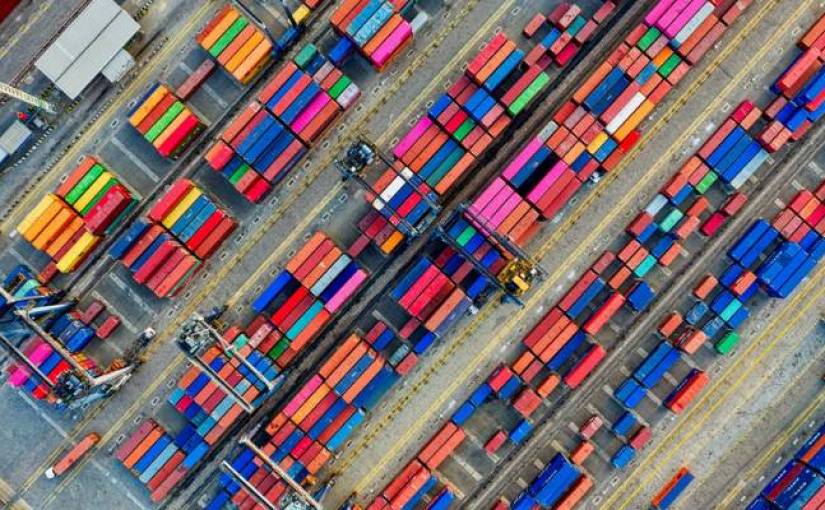Blockchain is the digital record-keeping technology behind cryptocurrency networks like Bitcoin and Etherium. It has become a potential game-changer for financial services and other industrial areas, including healthcare, automotive, government, insurance, retail & consumer goods, manufacturing, supply chain, and so on. And today, we will have a look at the application of blockchain technology in the supply chain.
With blockchain in the supply chain, traceability and the delivery of the products, coordination between partners, and financial aid access can be made more cost-efficient and rapid. To better understand this concept, we must learn about the basics of blockchain, its advantages in the supply chain, and the difference in the usage of blockchain in the supply chain compared to the use in cryptocurrency.
Understanding Blockchain
Blockchain is a cloud-based digital ledger or record of data with a shared database that shows real-time transactions and chronological changes to the ledger. The data or information is stored in a chain of blocks that’s secure, verifiable, and tamper-proof. In addition, the ledger itself can be programmed to trigger transactions automatically. As a result, blockchain will allow a limited number of known parties to protect their business from malicious activities while improving performance in the supply chain.
In essence, blockchain has two dominant types, i.e., Permission-less distributed ledgers, such as bitcoin, and Permission-ed centralized ledger governed by nodes and helps outside the public domain. This distinction in blockchain technology has essential effects in the supply-chain context.
Advantages of Blockchain Systems in Supply Chain
Blockchain is a revolutionary technology that transforms different industries’ business processes and economy, and logistics is no exception. So let’s uncover the way blockchain is advancing supply chain management.
-
Real-time visibility & Reporting
One of the major pitfalls in supply chain management is execution errors. However, the chaste record-keeping in blockchain can save a company from that. Whether it’s updating schedules or correcting provided information, blockchain offers an identifying element in every step of the supply chain. So that the mistakes become visible at the initial stages to easily adjust them as necessary.
Read: Blockchain Beyond Banking
-
Transparency & Trust
Blockchain helps create a unique record for each transaction that takes place within a supply chain. The information and inventory flows are encrypted and recorded in the blockchain ledger. This ledger helps managers of supply chains to instantly get the visibility of transactional history between suppliers and retailers. In addition, it helps in eliminating the blind spots from traditional record-keeping while offering enhanced transparency to improve coordination among parties.
Instead of checking with the distributor for the shipment status, the ledger can provide dynamic information access. By nature, blockchain ledgers cannot be altered or deleted. These ledgers record every change and need a general agreement to make these changes among the network. Even when an item is deleted from the record, you will get the information on when it has been deleted and by whom.
-
Authentication & Quality Check
Blockchain allows tracing goods’ origin from a mediator or store to a specific manufacturer. Each batch of goods is equipped with a tag to ensure data validity. These tags monitor the good’s location and interaction within parties of the supply chain to maintain quality checks.
-
Billing & Payment
Sending cargo from one place to another creates a supply chain that can be a difficult task to handle. As it involves around 30 organizations communicating with each other several times. These interactions usually relate to payment and billing. The transactions using the traditional approach are complex. They consume a lot of time and effort resulting in fraud, manipulation, and multiple errors. However, the usage of blockchain in the supply chain helps automate invoicing and payment via linking calculations to the performance of specific actions.
Besides, blockchain in the supply chain helps reduce the need for paperwork or intermediaries, eliminate errors, prevent frauds, ensure accuracy & compliance in financial calculations timing, and make processes faster.
-
Freight & Delivery
Blockchain’s smart contract in the supply chain can efficiently save the logistic industry from excessive spending. These smart contracts will make the business processes and workflow automated. The distributed ledger of blockchain will help in reducing the time for delivery. It will also detect fraud and reduce errors.
Real-World Applications of Blockchain in Supply Chain
Learning about the advantages of blockchain, you might want to know about the application of blockchain in real-world supply chains. So, let’s have a look at that as well.
- Ensuring the ethical source of the diamond is not an easy deal. It’s difficult to trace them from mining and handoffs from their supply chain. Brilliant Earth (a diamond and fine jewelry retailer) is tracking the origin of diamonds through the Everledger blockchain. They have integrated blockchain technology into their supply chain to securely track the diamond origin. It will also offer quality assurance to the customer. Blockchain will facilitate tracking with supporting documentation like bills and certifications. Besides, it will securely save the chain of custody information in the supply chain.
- Like Everledger, IBM has multiple ongoing collaborations with several diamond and gold leaders to help them create new solutions using blockchain in the supply chain for authenticating and tracking their products.
- Walmart, IBM, JD.com, and Tsinghua University are looking for a way to use blockchain to increase food transparency and shipment efficiency. It is being done because of the E.coli outbreaks every year. In this case, Walmart and JD.com handle the shipment and production of products. At the same time, Tsinghua University and IBM are conducting the research and maintenance of blockchain technology.
A Few More Applications to Consider
- IBM and Maersk together are working on cross-party, cross-border transactions that involve blockchain to improve the efficiency of the process.
- TagltSmart and OriginTrail aim to track wine bottles to track their legitimacy using blockchain technology for transparency and QR codes placed on each bottle with details.
- Tony’s Chocolonely has teamed up with Accenture to develop a private blockchain prototype that tests their Ivory Coast field for any child labor or slavery in cocoa supply chains to create a slave-free chocolate industry.
- Golden State Foods (GSF), a food service company, partnered with IBM on a pilot program that utilizes IoT devices to monitor temperature, RFID to track the movement of fresh beef, and blockchain technology to handle business rules among supply chains partners.
- Origintrail, in collaboration with Hoan Vu laboratories and Source Certain Int., is using blockchain to track food supply chains on a more profound and expansive scale. These laboratories perform 800 chemical and forensic tests on goods before uploading the results to Origintrail’s blockchain. The tests take place on a farm’s soil and air to ensure their freshness. If instated across all industries, this use of blockchain would be capable to assures the quality and safety of the food.
- Broken Hill Proprietary Company or BHP is introducing a solution based on blockchain technology to replace spreadsheets from tracking samples both externally and internally among the wide range of providers.
Takeaway
Numerous companies are exploring the advantages that leveraging blockchain technology can bring. Blockchain is one of those technologies that organize complex networks’ workflow. Blockchain’s capability to offer unique identifiers for completing a complex process makes it preferable for supply chain management. Moreover, blockchain enables you to track recalls with pinpoint accuracy for a better brand reputation.
The supply chain consists vast amount of data that needs to be transferred across supply chain tiers in real-time. Using blockchain in the supply chain, it becomes easier to automate processes, enhance traceability, improve security, and cost-efficiency. And the supply chains where participants are unknown, blockchain can help add transparency, traceability, and trust. For blockchain solutions that enhance the supply chain, learn about centralized or decentralized systems and choose the ideal one.
Image Credit: Provided by the author; Thank you!


















